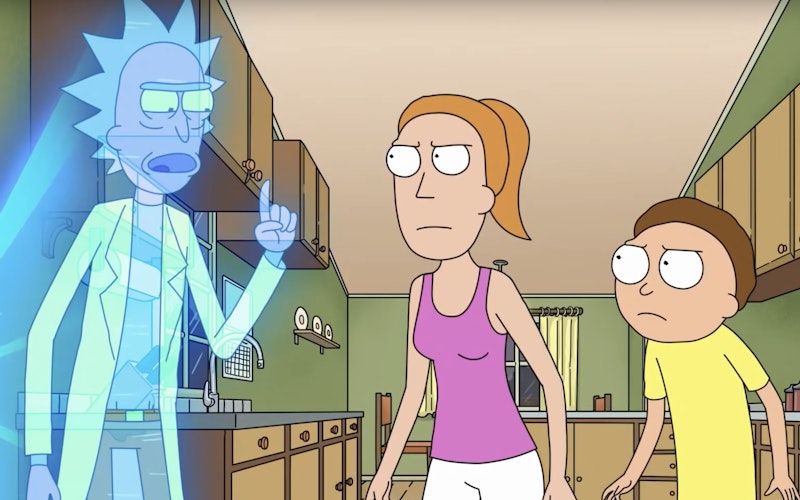
TV
Reconciliation on Rick and Morty
For four seasons of Rick and Morty, we’ve seen Rick Sanchez do the impossible, usually to his own ends.
He once froze time for six months to clean up after a house party. He once created an entire microplanet whose inhabitants’ sole purpose was to power his spaceship. He even once transformed himself into a talking pickle just to get out of going to family therapy. Rick is surly and selfish; he’s also brilliant, a mad scientist who’s managed to unlock the mysteries of existence. But Season 5 of the animated science-fiction series, which premiered on Adult Swim last summer and comes to Hulu and HBO Max Feb. 5, proves that even the smartest man alive still has a lot to learn.
What Rick (voiced by Justin Roiland) does know is that we are not alone in the universe. With his teenage grandson Morty (also voiced by Roiland), Rick has traversed galaxies, interacting with all manner of alien species. He’s battled and befriended monsters and witnessed civilizations rise and fall. He’s even had a love affair with an entire planet (not the people on the planet, but the planet itself). His exposure to other worlds has left him blunted to the wonders of our own. For Rick, existence is just too big to be concerned with the trifles of humanity.
He also knows that the universe is made up of infinite dimensions that coexist in parallel with our own. That means there are infinite Ricks out there, infinite Mortys acting as sidekicks, and infinite members of their family. (Our Rick, Rick C-137, nevertheless proclaims himself to be the “Rickest Rick” of them all.) For Rick, infinite dimensions also means infinite chances—thus, no consequences for his decisions. “Imagine doing anything you want,” he posits, “then hopping to a timeline where you never did it.”
He also objects to attempts at establishing canon—official details about his past or permanent changes to his story. Instead, Rick prefers a life of episodic adventure. With his portal gun in hand, he effortlessly bounces through space, time, and dimension, evading capture and chasing the next thrill. For Rick, attachment is futile in the face of infinity. He’s most concerned with self-preservation and with what’s immediately in front of him. This world, as well as the people in it, are more or less expendable.
For Rick, attachment is futile in the face of infinity.
In the faith community, sometimes we use our enlightenment to divide and exclude. We use our knowledge as a means to bolster our position—in this world or the next. We are less interested in connecting with all of humanity, for we fail to see humanity as a factor in our own salvation. Such a narrow, entitled view ignores the worth of those we deem inferior according to scripture—or at least according to our interpretation of it. When we perpetuate such division, we ultimately do a disservice to the community and to ourselves.
We’re told in Ecclesiastes that “wisdom, like an inheritance, is a good thing.” At the same time, we’re also reminded, “Do not be overrighteous, neither be overwise—why destroy yourself? Do not be overwicked, and do not be a fool—why die before your time?” On the one hand, this is a warning against moral superiority; after all, none of us is without sin. At the same time, we’re told not to let our knowledge of God’s word lead to indifference for this world. Indeed, doing so may prove counterproductive and cause us more harm in the long run, as we see with Rick Sanchez.
After countless episodic adventures, Season 5 of Rick and Morty marks the moment Rick finally accepts what his self-righteousness and selfishness have cost him over the years (and across dimensions). He comes to acknowledge that, even in a life of infinite escape hatches, what we do matters. This world and its people matter. Our relationships with one another matters. Which means that, despite Rick’s grumbling, canon matters too, as is evident throughout the season.
In the episode “Mort Dinner Rick Andre,” Rick reunites with his longtime nemesis, Mr. Nimbus, King of the Ocean (who somehow also controls the police). Mr. Nimbus (Dan Harmon) is one of the few who know how far Rick has “fallen” since running from his traumatic past. “All that’s left,” Nimbus laments, “is pity for a sad, drunk, shell of a man too afraid to see how alone he truly is.”
In “Amortycan Grickfitti,” Rick reaches an emotional milestone with his milquetoast son-in-law, Jerry (Chris Parnell). “If I’m genuinely cool,” he acquiesces, “I should be able to love you. Which I therefore do.”
“Rickternal Friendshine of the Spotless Mort” finds Rick risking his life to rescue Birdperson (Harmon), an avianoid freedom fighter whom Rick once abandoned on the battlefield. When asked why he would do something so altruistic this time, Rick begrudgingly admits to his former friend, “You matter. To me.”
And it’s in “Forgetting Sarick Mortshall” that Rick begins to assess perhaps his most important relationship, the one with his grandson and sidekick, Morty, who has felt the brunt of Rick's capricious and reckless behavior. “I'm a bad partner,” Rick confesses, “because I never made you a true partner.” By the end of the season, he’s learned just how valuable that partnership is and the dire consequence for neglecting it.
Indeed, it’s only when Rick ceases to run from this world that he can find a place in it. It’s only by exercising humility and kinship that Rick—or any of us—can reconcile (rickoncile?) a vast created universe with a Creator who deeply cares about our place in it.
Topics: TV